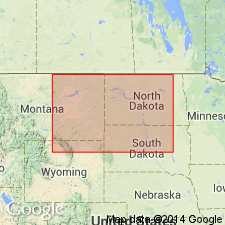
- Usage in publication:
-
- Pine salt
- Modifications:
-
- Named
- Dominant lithology:
-
- Salt
- AAPG geologic province:
-
- Williston basin
Summary:
Named as a formation in Williston basin, ND, SD, and MT. Type locality not designated. [Presumably name is from the Shell Oil Co. Pine unit 23-30 well, NE1/4 SE1/4 sec 30, T12N, R57E, Wibaux Co, MT, Williston basin, which is shown on a cross section illustrating correlation of the formation.] Occupies central part of Williston basin mostly in western ND, but extending into eastern MT and northwestern SD. Formerly an undifferentiated part of Spearfish formation. Is an evaporite deposit consisting predominantly of salt. Contains anhydrite and reddish-brown mudstone throughout. Maximum thickness (from isopach map) somewhat more than 300 ft in southwest ND. Overlain conformably by Saude formation (new); overlies unconformably Spearfish formation (restricted). Is assigned a Jurassic age based on similarity of its depositional pattern to that of Jurassic Piper formation. Considered to be nonmarine.
Source: GNU records (USGS DDS-6; Denver GNULEX).
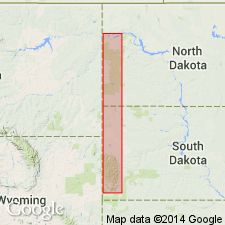
- Usage in publication:
-
- Pine salt
- Modifications:
-
- Overview
- Revised
- Age modified
- AAPG geologic province:
-
- Williston basin
- Chadron arch
Summary:
Subdivided Spearfish formation in Williston basin into (descending) units A-D. Unit C is the unit called Pine salt by Zieglar (1955). Correlated unit C with a sequence 118 ft thick of red shale and gypsum, the top of which is 80 ft below the top of Spearfish formation in a section at Buffalo Gap, Custer Co, SD on the east side of the Black Hills, on Chadron arch. Three prominent gypsum beds in the sequence appear equivalent to a tri-part subsurface correlation unit that can be carried widely by means of electric logs. Correlation can be carried across the Powder River basin into Chugwater formation of Bighorn basin. Unit C [or Pine salt] assigned an Early Triassic age based on correlation with better-dated rocks in central WY. See columns 68 and 69.
Source: GNU records (USGS DDS-6; Denver GNULEX).
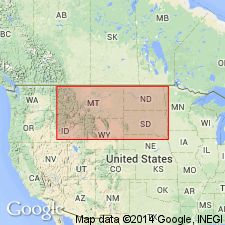
- Usage in publication:
-
- Pine salt*
- Modifications:
-
- Age modified
- AAPG geologic province:
-
- Williston basin
- Chadron arch
- Powder River basin
Summary:
The salt sequence called Pine salt by Zieglar (1955) in Williston basin is assigned to Spearfish formation and correlated with gypsum overlain by interbedded gypsum and mudstone in the lower part of Spearfish formation in the Black Hills, WY and SD. Permian-Triassic boundary is placed at top of Pine salt of Zieglar (1955) in Williston basin, and at top of gypsum and overlying interbedded gypsum and mudstone sequence in the lower part of Spearfish formation in the Black Hills. Is Permian in age based on correlation with rocks of Permian age in central WY.
Source: GNU records (USGS DDS-6; Denver GNULEX).
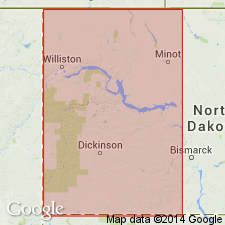
- Usage in publication:
-
- Pine Salt Member
- Modifications:
-
- Revised
- Overview
- AAPG geologic province:
-
- Williston basin
Summary:
Revised upper contact, and assigned as member of Spearfish Formation in Williston basin, ND. Excluded from top of member a persistent siltstone unit, and an overlying, equally persistent anhydrite and salt unit (referred to as the G marker bed), both of which were made part of Pine Salt by Zieglar, 1955). Overlies an unnamed lower shale member, underlies Saude Member (revised). Late Permian in age, based on correlation of the G marker bed with the top of Goose Egg Formation in WY.
Source: GNU records (USGS DDS-6; Denver GNULEX).
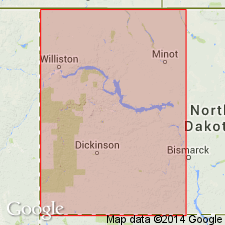
- Usage in publication:
-
- Pine Salt Member
- Modifications:
-
- Principal reference
- AAPG geologic province:
-
- Williston basin
Summary:
Expanded version of Dow (1964). Includes a reference section [designated the type section by the author] as the interval between 5,237 and 5,432 ft in the Carter Oil Co. L. L. Johnson No. 1 well, NW1/4 sec 9, T129N, R106W, Bowman Co, ND where the member is described (descending) as: salt, some moderate reddish-orange siltstone, minor gray shale, 33 ft; salt, 30 ft; salt, some medium-dark-gray shale and minor reddish-orange siltstone, 20 ft; salt, 50 ft; salt, minor dark-gray shale and moderate reddish-orange siltstone, 62 ft. White anhydrite occurs interbedded with the siltstone and the salt or halite. Conformably overlies Belfield Member (new) except along a narrow belt where it unconformably overlies eroded shale of Belfield; conformably overlain by Saude Member (as revised, Dow, 1964). Thickness 0 to about 300 ft. Includes isopach map and correlation diagrams. Permian in age based on correlations with Goose Egg Formation in WY.
Source: GNU records (USGS DDS-6; Denver GNULEX).
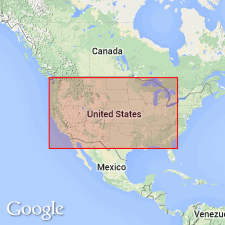
- Usage in publication:
-
- Pine Salt*
- Modifications:
-
- Revised
- Age modified
- AAPG geologic province:
-
- Williston basin
Summary:
Upper boundary restored to that of Zieglar (1955). Believed to be mainly Late Permian age with a small thickness of Lower Triassic rocks at top. Overlain unconformably by Saude Formation (considered Jurassic in age) in Shell Oil Co. No. 1 Pine unit well, sec 30, T12N, R57E, Wibaux Co, MT and vicinity, or where erosion cut less deeply into underlying rocks; farther south is overlain conformably by unnamed red beds [presumably equivalent to beds in the upper part of Spearfish Formation of the Black Hills, SD and WY]. Conformably overlies Spearfish Formation (as revised by Zieglar, 1955). Age assignment based on correlations with Goose Egg Formation in Natrona Co, WY. Shows correlations in wells in eastern MT and northeastern WY.
Source: GNU records (USGS DDS-6; Denver GNULEX).
For more information, please contact Nancy Stamm, Geologic Names Committee Secretary.
Asterisk (*) indicates published by U.S. Geological Survey authors.
"No current usage" (†) implies that a name has been abandoned or has fallen into disuse. Former usage and, if known, replacement name given in parentheses ( ).
Slash (/) indicates name conflicts with nomenclatural guidelines (CSN, 1933; ACSN, 1961, 1970; NACSN, 1983, 2005, 2021). May be explained within brackets ([ ]).

